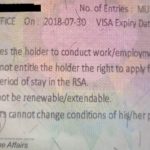In May, I brought together a Global Food Security Ministerial meeting at the United Nations to try to rally donors to close some of the urgent funding gaps and allow affected countries to highlight the areas where they need support. Our African colleagues made clear that, beyond emergency relief, what they really want is more investment in agricultural resilience, innovation, self-sufficiency. We’re responding to those calls.
Our initiative called Feed the Future will invest $11 billion over five years in 20 partner countries, 16 of which are in Africa. And a new initiative we launched with the United Arab Emirates is turbo-charging investment and innovation in climate smart agriculture.
Now, it’s not just agriculture. Across a range of fields, the United States is working with African partners to try to unlock innovation and growth. As we do, we’re building on African-led initiatives, such as the Africa Continental Free Trade Area, which, when fully implemented will comprise the fifth largest economic bloc in the world, and also the African Union’s Agenda 2063.
Now think about infrastructure for a minute. At the G7 meeting just recently held, President Biden led in launching the Partnership for Global Infrastructure and Investment, which will mobilize $600 billion globally toward concrete projects over the next five years. The United States is committed to raising $200 billion towards this effort, and we’re already implementing projects that are focused on health, on digital infrastructure, empowering women and girls, energy, and climate.
Consider youth. During this trip, I met with alumni of the Mandela Washington Fellowship. Since President Obama launched the program eight years ago, more than 5,000 rising leaders from every country in Sub-Saharan Africa have come to the United States for academic and leadership training – building skills and relationships that will last a lifetime. The broader YALI Network, which provides tools, resources, and a virtual community for young African leaders, now has more than 700,000 members.
Consider what we’re doing in health. In 2003, President George W. Bush created PEPFAR to make a transformational investment in HIV prevention, detection, treatment, and care. It’s one of the greatest initiatives, I think, the United States has undertaken in my lifetime. Since that time, we’ve invested over $100 billion in the effort, nearly all of it in partners in Sub-Saharan Africa. Together, we have saved the lives of an estimated 21 million people. We prevented millions more infections, including five and a half million babies born HIV-free.
Now, think about that for a second. These are big numbers. We talk about numbers, and it sometimes defies us really understanding what it’s all about. Each of these numbers is an individual life, an individual destiny, an individual story. And thanks to this incredible work, those stories have continued, and they’re going to contribute so much to the world that we share.
Today, PEPFAR supports 70,000 health clinics, 3,000 laboratories, 300,000 health workers, and countless DREAMS ambassadors, who help keep adolescent girls and young women safe from HIV.
Continued next page
(150 VIEWS)

